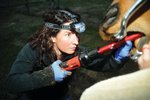
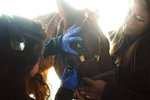
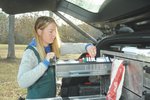
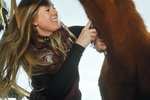
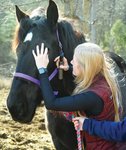
It’s a rare thing to find a doctor who makes house calls, but Dr. Stephanie Freese and her team at Polaris Equine do it all the time.
But when she says, “Say Ahhhh!,” she usually doesn’t get a response.
The patients at her clinic are among the most elegant of animals, but when they are in need of medical care, you can’t take your horse to the doctor. These doctors come to them.
Polaris Equine, a mobile veterinary service based in Pittsboro, has been taking care of horses, alpacas, llamas and other sick four-legged beasts in their service area for two years. Covering Chapel Hill, Apex, Fuquay-Varina, Cary and parts of Greensboro and Raleigh, the team of two vets and a vet tech are available weekdays, but do emergency visits 365 days a year.
Head veterinarian Dr. Stephanie Freese was born in North Carolina, but her life’s journey has taken her through many states in her professional practice after getting her veterinary degree. She’s been an equine vet for nine years, but began the business after working with animals in several West African countries and Australia.
Now back in the Carolinas, she and her staff — Dr. Callie Mitchell and vet tech Rebekah Fultz — offer care to animals on hobby farms across Central North Carolina.
One of the first questions people ask her is about the name of the business.
“The main reason is this: ‘Polaris’ is the name of the North Star. The North Star is both ever-present and somewhere you can always look to for guidance,” Freese said. “That is the essence of our medical philosophy — to be here whenever you need us and to show you the different paths you might choose to best care for your animals.”
Dr. Mitchell takes it even further.
“We strive to be very accessible to our clients at all times,” she said. “We work hard to create a family atmosphere and provide the best care possible to all of our patients, from the humble pet goat to the impressive show athlete.”
Polaris Equine cares for animals, like cows, which aren’t part of a large herd, such as a dairy, but rather part of a small farm. These small farms, also called hobby farms, are run for personal pleasure rather than for profit — something Dr. Mitchell is familiar with.
“I grew up on a hobby farm with horses, a cow, dogs and cats,” she said. “I always wanted to work with animals and help them to the best of my ability.”
Loving animals is part and parcel of the Polaris Equine team, but that’s too easy of a reason to take this career path, Dr. Freese says. Many people love animals, she noted, but don’t take it to the next step.
Fultz, the vet tech, is one animal lover who planned from an early age to go into the field. A vet tech can’t perform surgery, prescribe medications or diagnose disease. A similar role in the human medical field is that of a nurse.
“I knew from the start I wanted to be in the medical field and animals were a large part of my life,” she said. “In 2004, I was lucky enough to start a life of medicine and horses at N.C. State College of Veterinary Medicine, where I gained many technical skills and taught veterinary students.”
Dr. Freese chose her profession for another reason.
“For me, it was always about the challenge,” she said. “It was more challenging to become accepted to veterinary school than it was a human medical school. It is more challenging to work on a sick horse in the middle of a dark field than it is to do surgery in bright lights with a million assistants at your beck and call.”
There are many challenges in the field they’ve chosen. One of the unique aspects of Polaris Equine is its ability to offer equine chiropractic services, through Dr. Mitchell. Chiropractic for horses focuses on the animal’s skeletal system, and employs manipulation of the muscles to realign the bones, bringing relief and a return to proper movement. Just as people get out of alignment, Mitchell says, a horse may have the same problem and need assistance.
The larger size of their patients means that the patients could easily injure the doctors. Freese has incurred two broken bones in the line of work, and Mitchell has sustained bumps and bruises as well.
“Working with horses is inherently dangerous,” Dr. Mitchell said. “They are much larger than us and are flight or fight animals. We are relying on proper training, behavior modification, and judicious pharmacology to avoid personal injuries.”
“As far as our day-to-day work, it’s always dangerous,” Fultz agreed. “And the rain and cold are unforgiving.”
“We are general practitioners, surgeons, ophthalmologists, midwifes, orthopedic specialists, pediatricians, and hospice carers all in one,” Dr. Freese said.
The medical problems they observe in animals come from a variety of sources. In cooler weather, colic is a common problem, and wind storms will bring corneal ulcers, when a foreign object comes into contact with the eye. It’s a serious problem, but can be treated with antibiotics. If the eye doesn’t respond to the medication, the eye may have to be removed. Wet, rainy weather brings more hoof abscesses and skin problems, Mitchell said.
There is no standard day; every day is different.
“When their animal is sick or injured, it is often hard to administer ideal medicine in the field, and it is an emotional time for clients who do not always understand why we want to do the things we do or why something costs the amount that it does,” Dr. Mitchell said.
Animals only know that they are hurting, and don’t understand that the doctors and vet techs are trying to help.
“Equine medicine, in particular, is in-the-moment problem-solving with critical outcomes, and is arguably one of the most difficult fields of veterinary medicine to choose,” Dr. Freese said. “More often than not the horses understand we are there to help, but like many people, sometimes in the moment it is easy for them to forget and just focus on the pain, or the needle heading their way or the nasty tasting paste we insist on — and they’re very capable of demonstrating their displeasure.”
Sometimes an animal simply can’t be saved.
“We all have bad days that make us question our career choices,” Dr. Freese said. “Perhaps a patient you worked with, with all of your might to save, succumbs, or an emotional owner lashes out in grief, or you get squashed by a patient who doesn’t appreciate your efforts to help them. But I’ve been an equine vet for nine years now and I’m here to stay.”
For Dr. Mitchell, there is sadness with her work, but also joy.
“We all have bad days,” she said, “whether it is because you had to euthanize a patient you were attached to, or because a client was unhappy with you. Saying goodbye is never easy, but I take solace in knowing that I am able to ease their suffering. [It is] easier to focus emotional energy on the cases and patients we succeed in treating.”
The rewards of the job make the difficulties and risk worth it. There are patients like Sven, a goat who was expected to be euthanized — in spite of great care taken to help the animal by its owner — because of severe pneumonia. Fultz decided instead to try to nurse the sick animal back to health, and through lots of love and rehabilitation, Sven is now living a pampered life on Fultz’s family’s farm.
“All in all, it is a very rewarding career,” Dr. Freese said. “Our clients and patients are like an extended family and that is a wonderful feeling to have.”
“The joy we get is from helping the animals, and in turn bringing joy and happiness to the client. I get particular joy from chiropractic adjustment as the treatment gives near immediate relief to my patients,” Dr. Mitchell said.
“I am one of the lucky ones that can say I truly love my career and equine medicine family,” Fultz said. “I think that’s what truly makes Polaris stand out from the rest.”
“All in all, it is a very rewarding career,” Dr. Freese said. “Our clients and patients are like an extended family, and that is a wonderful feeling to have. “